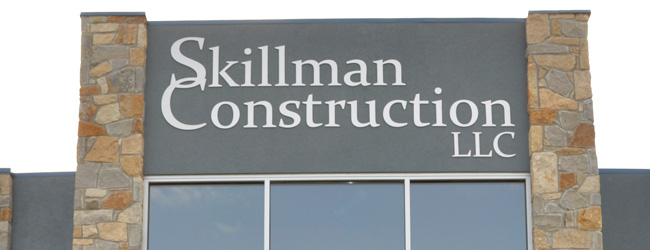
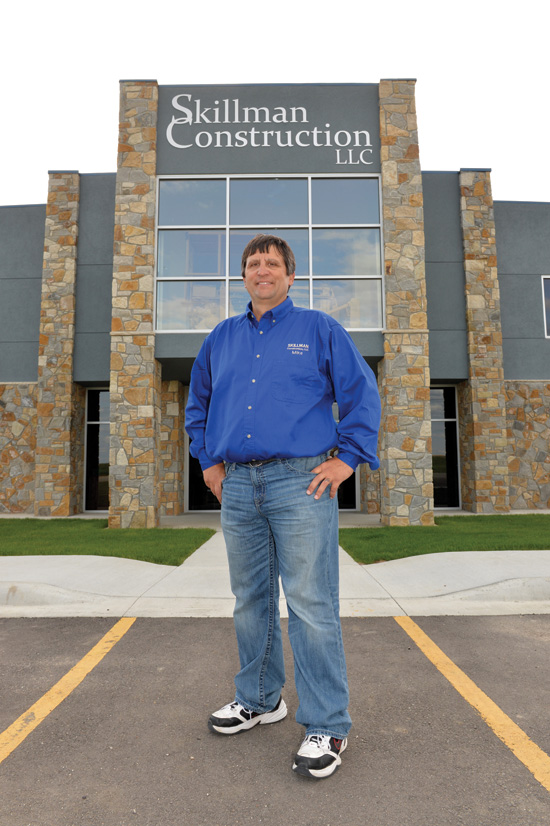
Growing up in Kansas in a community of farmers, Mike Skillman would have described himself as an average guy. The one thing that he had going for himself was a well-developed worth ethic. “I started raking hay by the age of seven. At the end of the summer, grandpa paid me $75, and I thought I was on top of the world. I realized that I could work and make money.” That summer impressed upon him the value of hard work. Since he had worked so hard for that first paycheck, it remained untouched in his bank account until he purchased his first car nearly ten years later.
Working hard was nothing new to Mike as he’d seen his father, his grandfather, and all the other farmers in the area practice the dawn to dusk workday, six days a week, while growing up. People worked hard. “Grandpa was the mayor three times and a congressman,” Mike says. His example taught Mike about his responsibility to the community and the importance of giving back. Being successful wasn’t just about money, but about enriching the lives of the people who surround you.
A turning point was when Mike married his high school sweetheart in 1988 and when his eldest son was born in 1989. Mike was working at a grain elevator; and while he liked it, he had the big idea to buy a bulldozer in order to make some more money on the weekends. Mike wanted to do more for his new family. “My wife, Jo, has been a crucial part of my business success,” Mike says. His wife helped him gain the confidence in himself that he could be more than that scrawny high school kid she fell in love with, boosting Mike’s built-in drive for work.
Mike got into the construction business as a natural offshoot to his business of moving dirt for farmers in his community. Whatever dirt a farmer needed moved, Mike had a bulldozer that could do the job. Mike used his bulldozer to build terraces and berms on farmland to reduce wind erosion. He also moved dirt to build farm ponds, lagoons, and small waterways.
Nothing stood in the way of Mike’s bulldozer. And, nothing stood in the way of Mike’s ambition to build a well-respected company in his community and a better life for his family.
Soon the demand for Mike and his bulldozer was steady enough that Mike decided he could take the risk in quitting his job to start a company that could be the vehicle for achieving the dreams he had for himself and his family.
His wife supported him from the very beginning. It’s why they’ve been a great pair, according to Mike. “I wouldn’t be where I am today, without her. She worked, so that I could do this full-time. The banker said to give it a year to try working full time, to see if owning my own business would work.” His wife worked the first three or four years to help support the family, as well as taking care of the books, allowing the business to grow. Sales doubled every year from that initial $8,000 when he just worked for local people and friends, doing work on their farms.
In 1990 Mike expanded with a dump truck to haul rocks. Soon he was making $16,000. Then Mike doubled again to $30,000 and again to $60,000 then $100,000. Mike purchased another truck and continued to grow, hitting gross sales of $1 million, which met the goal he set out to achieve when he started Skillman Construction.
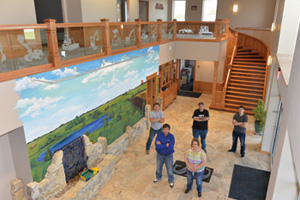 But once Mike reached that goal, it opened the door to much bigger goals. In 2014 Mike’s business generated $15 million. The tremendous growth of Skillman Construction, and its related companies, just amazed Mike. Mike has built a company which went from a one-man operation making $8,000 in 1989 to nearly a hundred employees in six separate companies today that are on pace to do $20 million. Mike’s hard work is grounded in a simple mission statement for the company. “We will be profitable,” says Mike, “because without profits, we can’t take care of our families, our employees, and our community; and without them, we wouldn’t be where we are today.”
But once Mike reached that goal, it opened the door to much bigger goals. In 2014 Mike’s business generated $15 million. The tremendous growth of Skillman Construction, and its related companies, just amazed Mike. Mike has built a company which went from a one-man operation making $8,000 in 1989 to nearly a hundred employees in six separate companies today that are on pace to do $20 million. Mike’s hard work is grounded in a simple mission statement for the company. “We will be profitable,” says Mike, “because without profits, we can’t take care of our families, our employees, and our community; and without them, we wouldn’t be where we are today.”
Growing Skillman Construction from a part-time job moving dirt into a company poised to achieve $20 million in annual revenue has not been easy. As the business was growing, Mike didn’t know how to manage the growth. The only way Mike knew how to manage the company was to work 80–90 hours a week, which left little time for any family life. He often was working past midnight to 1 a.m. getting the equipment ready for the next day.
Mike describes himself at that time as physically present, but having two cell phones attached to his head. “It was hectic and frustrating. I was running it all by myself,” he said. Mike found himself taking business calls in the stands while watching one of his sons wrestle and taking calls from customers while standing in the coach’s box outside third base while coaching for another son’s baseball team. And, by trying to do everything himself, he had reached a threshold that he wasn’t able to cross. There just wasn’t enough time in the day for him to do it all as he had done in the past to continue to grow his business. Mike realized he needed the help of the GPS consultants.
“My oldest son,” Mike says regretfully, “was shorted. I spent all of my time working. Yes, I showed up for all of the school events, but I was not home in the evening. I was missing some of the best years of my life.”
According to Skillman, one of the major insights given to him by the GPS Senior Business Analyst was when he pointed out how bad his paperwork was—to the point that Skillman was losing profits through poor paperwork. That hit home. Mike says, “The analyst pointed out that due to our lack of producing billing on time and staying after our accounts receivables, we were dragging things out, which was costing us interest on not only our banking accounts, but our payables. That also meant we weren’t taking care of our vendors in a proper way, getting hit with fees. The analyst showed we had this lump of money out there that it was our money, but we weren’t doing anything with it. He said, ‘You are costing yourself money by not getting this money in quicker and taking care of your business in a more costefficient manner.’”
It was that moment when the light bulb clicked on that Mike needed to do something. “We have always been good at what we did outside. There was never a doubt; people hired us from all over because we were very good on our machines. We knew what we were doing, we could do it top of the line. But our paperwork was not there. And in order to get our business back in a more profitable state, we needed to get our paperwork where it needed to be. The analyst pointed that out. It was what I needed to hear.”
The GPS Senior Business Analyst didn’t pull any punches and just set the facts out in front of Mike. At first it was hard to swallow, but deep down Mike said to himself: “You know he is right, the numbers were right there. Yeah, I see. There are thousands of dollars lying there that I am losing because I am not efficient enough with my paperwork.” It was a big eye opener for Mike to realize that there was more to being successful in business than doing good work for your customers and working hard all day long. He needed systems to maximize the knowledge he had gained so that it could be leveraged into a more successful business operation.
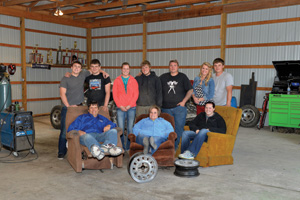 The analysis of the business, Mike says, “brought into perspective that with our knowledge, that is where we are going to make the money. It’s not just me out there on a shovel making the money. It’s the knowledge that I have gained over the last twenty some years, taking what I have learned and projecting it out to these other guys, younger guys, or people under me. Let them be successful, and just manage what they are doing.”
The analysis of the business, Mike says, “brought into perspective that with our knowledge, that is where we are going to make the money. It’s not just me out there on a shovel making the money. It’s the knowledge that I have gained over the last twenty some years, taking what I have learned and projecting it out to these other guys, younger guys, or people under me. Let them be successful, and just manage what they are doing.”
Once Skillman brought in the consultants to re-organize the business with the proper internal systems, the company just took off with more responsibility shared among his employees. “Our company has just flourished. Now there is not just one of me, there are almost ten of me. They are still not to the point of exactly what I can do, but there’s a piece of me on each one of them. We are learning how we can put them in a position where they can succeed—is what it amounts to. That’s probably the biggest thing they have done for us—help me to project out, teach people. And plus then it helped me take care of my paperwork, that’s the biggest thing it’s done for me,” Mike says.
Skillman credits GPS management consulting services for restoring his work–life balance. “The consultants caught me on the right day, when I was willing to listen,” he says. His construction firm had been hit by the recession in 2008. Mike found that working for the Wolf Creek Nuclear Generating Station was a solid business option, but the required paperwork was daunting. Skillman didn’t have the necessary organization in place to keep track of all that the federal nuclear regulatory commission required him to do.
Mike was open to getting outside help from the GPS team of consultants to re-organize the company so that he could run the business by information rather than by observation as he had done from the beginning. The consultants created job descriptions and assigned responsibilities for all key employees. One of his sons, for example, was trained to run the maintenance and equipment shop to free up Mike to focus on the broader issues of the business-of-the-business.
The consultants built a new foundation for accountability for all employees in the company which has increased productivity. “Probably one of the biggest things that helped our productivity was being able to monitor our employees, as far as monitoring what they are doing on a daily basis. Daily logs. They fill out a daily log sheet of what they did on what job. That job has a number to it. So we track that number, which helps us track our labor cost; it tracks our fuel costs; it tracks everything associated with that job. So if they go to a separate job, they put a different number in there, then that time relates to that job.
“And that allows us to judge each job on its own grounds. Did we make money on that job? Even if it’s one load of rock: did we make money hauling that one load of rock? Did we make money on moving that ten thousand yards of dirt? From a one hour job to a job that takes 2 months, at the end of that job, did we make money? We can pull out that analysis, that cost accounting that was put in place by the consultants.
“Let’s say it’s a $100,000 job. We are half way through it. Have we already spent half our money on labor? Are material costs where they are supposed to be? And by doing cost accounting, we get an accurate deal, almost on a daily basis, if you want, of where that job is. And at the end of the job, you are getting a definite picture: did we make money? If we are not making money, do we want to continue to do that type of work? If we are not making money, why are we doing it? We are not here for the experience anymore; we’ve got that. We need to be here for our community or for our employees,” Mike says with the utmost sincerity.
As well, the consulting project has helped develop his employees. “One thing it has done is made our employees more in development of their own—taking care of their own business. As far as, if they want to be successful in our company, then they are held to a standard, and we are able to measure: are they living up to a standard? Do they want a pay raise? Have they taken care of business in a good fashion as they go through our employee evaluations? We had never done that before.”
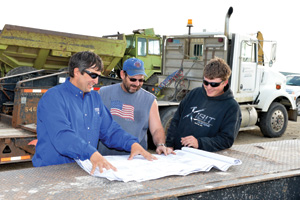 “Now we are doing employee evaluations. The foreman does the evaluation on his own crew. And then we sit down and go over it with the foreman. Why are you giving him a bad score? Is there something we can do to make that up? Is he having financial problems or maybe he’s having troubles at home? We are trying to pick it out before it becomes a bad problem. Let’s help our employees. We can’t maintain this business without our employees. We can’t run this big of a business with one or two people. We have to have our employees. If we’ve got good employees, we don’t want to lose them,” Mike says.
“Now we are doing employee evaluations. The foreman does the evaluation on his own crew. And then we sit down and go over it with the foreman. Why are you giving him a bad score? Is there something we can do to make that up? Is he having financial problems or maybe he’s having troubles at home? We are trying to pick it out before it becomes a bad problem. Let’s help our employees. We can’t maintain this business without our employees. We can’t run this big of a business with one or two people. We have to have our employees. If we’ve got good employees, we don’t want to lose them,” Mike says.
“By taking care of them and them taking care of us, we are developing a relationship which is becoming good for all of us. And we put in an employee incentive plan. We are still working through that, but it’s an awesome deal. The employees are buying into it. The more profitable they make the job; they are going to see it. Our employees buy into it, and all of a sudden our productivity jumps up. They are not sitting there leaning on a shovel because they are getting paid no matter what. ‘I am going to get a portion of that.’”
Skillman believes that if he takes care of his employees, they are going to take care of him. This one fundamental change, he says, “has been a big improvement on our productivity and employee morale and just all around business perspective.”
Furthermore, the consultants helped Skillman establish goals. “We always had goals, but it was basically the goals in my head. I had a thought that I wanted to be here someday, but I didn’t have a good clear path on how to get there. I was always good at working hard, getting stuff done. But they showed me how to have this path in place in order to make that goal.”
“And what has been wild is that not only have we met the goals that I previously had set a couple of years ago, but now we are on the road to meeting our 10 year goal here within the next few years. We have grown faster than what we even expected. By going down the path they gave us, we know where we are headed. We know what it takes to achieve it; and as long as we push forward and follow the path, we will take that step to every goal and we’ll succeed in getting there,” Mike says.
As fate would have it, during the middle of his consulting engagement, the nuclear plant had a 24-hour emergency shut-down due to a water leak. Mike’s team was called in for two weeks. His GPS consultant was there to show Mike how to manage the stringent paperwork for the emergency work. The company earned $300,000 in those two weeks and then landed a contract to be on-call for 24 hours a day.
Skillman’s consultant helped him negotiate the contract with terms more favorable to his business. The consultant had pushed hard for one change in the agreement that Wolf Creek management agreed to which resulted in Skillman Construction generating $750,000 above and beyond what Mike was expecting. “My consultant showed me how big business worked. He gave me the insight I needed, as I had only dealt with farmers before.”
A couple years later and having reached a plateau in his growth, Mike brought in the GPS consultants for a second engagement focused on the processes and systems needed get back on a growth track. “The company started to gain speed as the nuclear plant wanted more and more from us. We grew from a million in sales to $5.4 million.” After the second consulting engagement, Mike now had the systems in place he needed for accurate job costing and the reports he needed to manage a larger business.
And as it is often said, luck favors those who are prepared. There was a long outage at Wolf Creek. Mike’s company was chosen to pick up the slack for another vendor that had been brought in but had struggled with doing all that was necessary for the nuclear facility. Mike says, “We made $9 million on that project. We were on a rocket ship again. The more we did, the more Wolf Creek liked it. The paperwork still needed some tweaking, but by the end of 2013, we pulled in a total of $14.5 million.” And Skillman Construction is still growing. In 2014 Skillman Construction had revenues of $15 million, and Mike says they are on pace to grow into a $20 million company shortly.
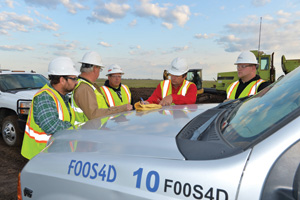 One of the biggest changes the consultants were able to achieve was in showing him how to manage the business without sacrificing his family life. “Before, it was 60–80 hours a week, constantly on the phone, could not go to supper with my wife and family without getting multiple phone calls. I think I used to average anywhere from 50–60 phone calls a day. That’s what comes in. That’s not what I put out. You figure that up in an average day, and it doesn’t give you a lot of time for personal time. I was the fireman. The phone was a way of putting out fires. My phone was the only way I knew how to take care of business,” Mike says.
One of the biggest changes the consultants were able to achieve was in showing him how to manage the business without sacrificing his family life. “Before, it was 60–80 hours a week, constantly on the phone, could not go to supper with my wife and family without getting multiple phone calls. I think I used to average anywhere from 50–60 phone calls a day. That’s what comes in. That’s not what I put out. You figure that up in an average day, and it doesn’t give you a lot of time for personal time. I was the fireman. The phone was a way of putting out fires. My phone was the only way I knew how to take care of business,” Mike says.
“The consultant showed me a different way to set up the management right for people to take care of their specific jobs, their specific tasks. The phone calls lessened. Now I am getting the phone calls, literally, ‘Hey how do we make this decision? Is this the way you want us to go?’ It’s more of a quick reference, to help them do what they know they need to do. Or, maybe it’s the big client who needs that one-on-one with me. I am not dealing with a flat tire per se. I am dealing with the whole bus. We are taking it down the road. Somebody else is going to fix the flat tire. I am going to keep the bus moving. And, that is what has changed.”
So the biggest change has been Skillman’s family life. “Not only is the business running better, it has freed up my time to be with my family, which is the whole reason I do this anyway. I love my family. They are the reason I work hard to provide for my family. Now I am providing for my family better than I ever have, plus I am there. I am not out on the job. I am not working. I am with them. I still work 8–10 hours a day; but it’s not 16. It’s not seven days a week; it’s pretty much five. My weekends are pretty much off. I can do things with my family. Before I was so busy, everybody would go to the movie but dad,” he says.
“There is no greater joy in your life than watching your kids grow up. With my oldest son who loves to demo cars, we follow him all summer to demolition derbies. With my middle son who just graduated from high school—my two middle sons, one is adopted— that gave us the opportunity to reach out to him, a kid who didn’t have the best family life. He spent a lot of time at our house. Now we brought him into our family, and we raise him. He and my middle son are the same age—both graduated last year. They are both awesome kids.
“One of my sons is state champ in wrestling. The other one was a state honored football player. My youngest son is an actor. Puts on plays. Just got done doing ‘Bye Bye Birdie,’ and he’s one of the lead parts at fourteen years old. That’s truly what’s life is about—what you are doing with your kids. Being able to see them out there on the field of play or in that acting role, that’s what you will remember. It’s not going to be whether I got that load of dirt delivered on time. It’s truly what you did with your family. If you love your family, this will bring you a lot more peace and enjoyment because you will have more time to spend with them.”
But with all his success, Mike is still the same Mike Skillman who got started in the dirt with a bulldozer. He is a man devoted to his family and his community. He says the most important result of his success has been the opportunity to contribute to his community: first, as the largest private employer in the county, providing good jobs with good benefits, and second, through supporting various charities while being active on their boards. “I love doing it. I feel more joy from giving back than from working, now,” Mike says. He’s especially involved in a scholarship program, giving away $15 thousand in college scholarships every year.
According to Mike, you treat people the way that you’d want to be treated. For employees that means you’re not asking them to do anything that you wouldn’t do or you haven’t done yourself. For customers, “the big deal is that we like to do things right the first time. We don’t like to do things twice. Doing a good job, offering a good value, has helped us to grow at the nuclear plant and what we call ‘the real world,’ meaning customers other than the plant. Take care of your customers and they appreciate it. This allows you to continue to grow.”
Skillman has built a business beyond his wildest dreams, but what is most important to Mike is that he can enjoy his success with his family.


Mike’s early start with hard work and being responsible with money is no surprise considering the award he got here. Although getting that first car was probably an awesome treat for saving his earnings, the car he can afford now probably shows even more growth.
Mike’s generosity is probably a big help to his successful business. A guy who gives $15 thousand in college scholarships every year can really speak to the community he serves.
It is great to be able to enjoy your time with a happy family. It’s nice that he has a good perspective when it comes to success.